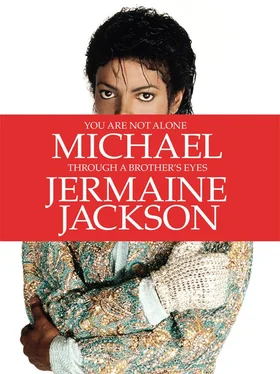At the front, a short path from the sidewalk cut through grass to a black, solid door, which, when slammed, shook the whole house. One step inside and there was the living room – and the brown sofa-bed where the girls slept – with the kitchen and utility room to the left. Straight ahead was a hallway – about two strides long – leading to the boys’ bedroom on the right, and our parents’ room on the left, adjacent to the back bathroom.
Jackson Street was part of a quiet grid bounded by Interstate-80 to the south and a railroad to the north. Directions to our home were easy because of the landmark we backed on to: Theodore Roosevelt High School and a sports field. Its outer chain-link fence created 23rd Avenue’s dead-end, providing an open view of the running track to the left and, just to the right, a baseball field with bleachers on the far side. Joseph said we were lucky to own our home. Others in the neighbourhood were not so fortunate. For this reason, we never officially classed ourselves as ‘poor’ because the people who lived in the Delaney Projects – across the field on the other side of the high school – were living in government tract housing, which we could see in the distance from our backyard. ‘There is always somebody worse off, no matter how bad things might appear,’ we were told. So, the best way of describing our situation was: not enough money to buy anything new, but we somehow scraped by and survived.
Mother learned how to make food last: a freezer was more essential than a car or a television in the black community. Make food in bulk, freeze it, thaw it, eat it. We often had the same meals over and over again: bowls of pinto beans and pinto soup, chicken, chicken and chicken, egg sandwiches, mackerel with rice, and we ate so much spaghetti that I can’t stand pasta today. We made popsicles from Kool-Aid. We even grew our own vegetables because Joseph had a nearby allotment, producing potatoes, string beans, black-eyed peas, cabbage, beets … and peanuts. From an early age, we were taught how to plant seeds and peanuts, lining up enough space so they had room to grow. If we moaned – and we often did – about getting our hands and knees dirty, Joseph just reminded us that his first job as a teenager was working the cotton fields ‘where I collected 300 pounds of the stuff each day.’ He said Mother was ‘the best damn cook in the city!’ and dinner was always waiting for him as he walked through the door. She kept the house spotless, he said. Everything was always neat. This made her the perfect wife, he said.
He couldn’t fault Rebbie either because she took on motherly duties – preparing the food, cooking, cleaning, overseeing chores – whenever Mother worked. Rebbie was the big sister turned nanny and was equally stern, gentle, methodical and controlled. If I have one abiding memory of Rebbie, it’s of her standing in the kitchen, baking cookies and tea-cakes for us all. She was also the first child to show ‘promise’, according to Joseph, entering and winning local dance competitions. She and Jackie had some duet thing going on, and brought home prize certificates and trophies.
Mother worked weekdays, some Saturdays and some evenings as a cashier at Sears. She couldn’t really afford to shop there. When she did, she chose items to ‘put in Layaway’, reserving something with a down payment, then making a series of small instalments before taking the item home. Sears was our Harrods, and we grew up hearing the words ‘put it in Layaway’. We all hated seeing Mother handing over money and walking away empty-handed. That made no sense to us. Feeling hard done by, we kids regularly moaned about it, but not Mother. She just got on with life and trusted in God. If she ever had a moment to sit down, she spent it reading the Bible.
As a two-year-old, she had had polio, which led to partial paralysis; she had worn a wooden leg splint until she was 10. I don’t know too much about her suffering except that she had several operations, missed a lot of school and was left with a permanent limp because one leg is shorter than the other but I’ve never once heard her complain about it. Instead, she always said how grateful she was to have survived a disease that killed many others. She had dreamed of becoming an actress, but she showed no resentment over a dream that illness had crushed. Her condition led to some merciless taunting from other children when she was a teenager, which left her painfully self-conscious and shy. On one early date with Joseph as a 19 year old, they were on the dance-floor at some party, moving cheek to cheek to a slow number, when Mother started trembling. ‘What’s the matter, Katie?’ asked Joseph.
‘Everyone is staring at us,’ she said, head down, unable to look up.
He looked around and they were the only couple on the floor. He noticed people pointing and talking behind their hands, presumably about one of Mother’s legs being shorter than the other, or that one of her heels was a wedge to correct her balance. She had grown up dreading parties and social gatherings, but Joseph ignored the stares and turned it into a positive. ‘We have the floor to ourselves, Katie,’ he said. ‘Let’s keep dancing.’
Mother had moved from Alabama to Indiana as a child when Papa Prince chased work in the steel industry. She had dreamed of one day meeting a musician so guitar-playing Joseph fitted the bill, and it took the length of one spring and one summer for their romance to turn into marriage. They had ‘met’ in the street. It’s probably more accurate to say that Mother was in the street and Joseph was inside, sitting near his front window, when she rode by on a bicycle. They noticed each other and, for another week or two, she kept to the same route. One day, he plucked up the nerve to rush outside and introduce himself. That led to a date at the movies and then the party with the dance-floor. Katie Scruse, the golden-skinned girl so shy she struggled to look anyone in the face, fell in love with Joseph Jackson, the lean, brash, charismatic working man. They were wed by a Justice of the Peace in November 1949 and bought our childhood home in Gary for $8,500, using his savings and a loan from Mother’s step-father.
As their plans for three children became four, then five and so on, they started saving what little money Mother could earn as she harboured a dream that Joseph would one day build an extension for an extra bedroom and more space. We grew up with a stack of bricks in the backyard – a constant reminder of our mother’s hope for a bigger and better home.
Our little house comes with so many layers in my memory. Its compactness – huddling around Mother and living on top of one another – might not have made it the most comfortable home but it reflected our parents’ continual talk of togetherness and staying close. Within this togetherness, there comes loyalty. With loyalty comes strength. This was instilled in us. It was why we became a unit, moving together as one. Few in Gary could claim such family cohesion. It was a working man’s city built in 1906 by the muscle of African-American immigrants who helped turn a north-west Indiana landscape of sand dunes and scrub vegetation into a hub of the national steel industry.
Old men always spoke of a blood, sweat and toil work ethic back in the day. No man from Gary was ever afraid of putting in the hours and doing the grind. ‘If you work real hard, you will achieve,’ Joseph said. ‘You get back what you put in.’ In the eyes of his forefathers, getting a paid job and owning a house represented ‘achievement’, but he always wanted us to be more than he became. None of us grew up with a dream that ran into a father’s resistance: ‘You’ll stop this day-dreaming and get yourself a real job!’ No. Our father wanted us to have a dream, and hold on to it.
Читать дальше












